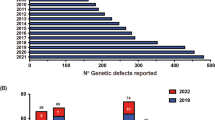Abstract
In tests with 72 human donors, the outcome of the xenogeneic human-mouse MLR was influenced more by the general capacity of the human responder cells to react than by the MHS genotype of the mouse stimulating cells. While the response of the human lymphocytes of the same donor to the lymphocytes of six congenic mouse strains with differentH-2 haplotypes was generally rather similar, there were pronounced differences among individual human donors in the reactivity in these tests. These differences correlated with HLA, since the low reactivity was associated with the presence of the antigens HLA-AW25, HLA-B18, and HLA-DW2. The effect of the presence of antigens AW25, B18 was much more pronounced in males than in females. The low capacity to react in xenogeneic MLR in individuals with antigens HLA-AW25 and HLA-B18 may be the result of the general immune insufficiency associated with these antigens, which also includes C2 defficiency and association with immunopathological diorders.
Similar content being viewed by others
References
Asantila, T., Vahala, J., and Toivanen, P.: Response of human fetal lymphocytes in xenogeneic mixed lekuocyte culture: phylogenetic and ontogenetic aspects.Immunogenetics 1:272–290, 1974
Bach, F.H., Engstrom, M.A., Bach, M.L., and Sell, K.W.: Histocompatibility matching. VII. Mixed leukocyte cultures between chimpanzee and man.Transplant. Proc. 4:97–100, 1972
Boyum, A.: Isolation of mononuclear cells and granulocytes from human blood.Scand. J. Clin. Lab. Invest. 21, Suppl. 97:1–109, 1968
čapková, J. and Démant, P.: Genetic studies of the H-2-associated complement gene.Folia Biol. (Praha) 20:101–115, 1974
Day, N.K., L'Esperance, P., Good, R.A., Michael, A.F., Hanem, J.A., Dupont, B., and Jersild, D.: Hereditary C2 deficiency: genetic studies and association with theHL-A system.J. Exp. Med. 141:1464–1469, 1975
Friend, P.S., Handwerger, B.S., Kim, Y., Michael, A.F., and Yunis, E.J.: C2 deficiency in man. Genetic relationship to a mixed lymphocyte reaction determinant (7ax).Immunogenetics 2:569–576, 1975
Fu, S.M., Kunkel, H.G., Brusman, H.P., Allen, F.H., and Fotino, M.: Evidence for linkage betweenHL-A histocompatibility genes and those involved in the synthesis of the second component of complement.J. Exp. Med. 140:1108–1111, 1974
Hartzman, R.J., Segall, M., Bach, M.L., and Bach, F.H.: Histocompatibility matching. VI. Miniaturization of the mixed leukocyte culture test: a preliminary report.Transplantation 11:268–273, 1971
Hersh, E.H.: Blastogenic responses of human lymphocytes to xenogeneic cells in vitro.Transplantation 12:287–293, 1971
Hirshberg, H., Rankin, B., and Thorsby, E.: Specificity of human lymphocytes proliferating in response to allogeneic and xenogeneic cells in vitro.Transplantation 17:593–599, 1974
Lindahl, K.F.: Specificity of xenograft reactions in vitro. Ph. D. thesis, University of Wisconsin, 1975
Micková, M. and Iványi, P.: Sex-dependent andH-2-linked influence on expressivity of the brachyury gene in mice.J. Hered. 65:369–372, 1974
Micková, M. and Iványi, P.: Influence of the H-2 system on the sensitivity of vesicular glands to testosterone hormone.Folia Biol. (Praha) 21:435–436, 1975
Osoba, D. and Falk, J.: The mixed leukocyte reaction in man. Effects of pools of stimulating cells selected on the basis of cross-reactingHL-A specificities.Cell. Immunol. 10:117–127, 1974
Petrányi, G.Gy., Benczur, M., Onody, C.E., and Hollán, S.R.: HL-A 3,7 and lymphocyte cytotoxic activity.Lancet 1:736, 1974
Rychliková, M. and Démant, P.: Influence of non-H-2 genotype on the response to H-2-linked mixed lymphocyte reaction stimulating (MLR-S) genes.Folia Biol. (Praha) 21:65–69, 1975
Rychliková, M., Démant, P., and Iványi, P.: The mixed lymphocyte reaction in H-2K, H-2D, and non-H-2 incompatibility.Biomedicine 18:401–407, 1973
Widmer, M.B. and Bach, F.H.: Allogeneic and xenogeneic response in mixed leukocyte cultures.J. Exp. Med. 135:1204–1208, 1972
Yunis, E.J. and Amos, D.B.: Three closely linked genetic systems relevant to transplantation.Proc. Nat. Acad. Sci. U.S.A. 68:3031–3035, 1971
Author information
Authors and Affiliations
Rights and permissions
About this article
Cite this article
Cukrová, V., Rychlíková, M. & Démant, P. Defective MLR capacitation in the human: Low xenogeneic MLR capacity associated with HLA antigens AW25 B18, and DW2. Immunogenetics 4, 531–540 (1977). https://doi.org/10.1007/BF01575687
Received:
Revised:
Issue Date:
DOI: https://doi.org/10.1007/BF01575687




